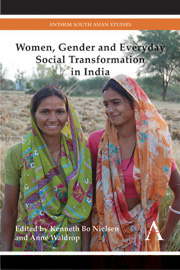Book contents
- Frontmatter
- Contents
- Acknowledgments
- Women and Gender in a Changing India
- PART I WORK, TECHNOLOGY, ASPIRATIONS
- PART II DEMOCRACY AND THE DEVELOPMENTAL STATE
- PART III ASSERTIONS AND ACTIVISM
- Chapter Eleven New Subalterns? Feminist Activism in an Era of Neoliberal Development
- Chapter Twelve Family, Femininity, Feminism: ‘Structures of Feeling’ in the Articulation of Men's Rights
- Chapter Thirteen Women's Activism in the Singur Movement, West Bengal
- Chapter Fourteen The Women's Question and Indian Maoism
- Chapter Fifteen Caste and Class in Gendered Religion: Dalit Women in Chennai's Slums
- About the Editors and Contributors
Chapter Fifteen - Caste and Class in Gendered Religion: Dalit Women in Chennai's Slums
from PART III - ASSERTIONS AND ACTIVISM
Published online by Cambridge University Press: 05 October 2014
- Frontmatter
- Contents
- Acknowledgments
- Women and Gender in a Changing India
- PART I WORK, TECHNOLOGY, ASPIRATIONS
- PART II DEMOCRACY AND THE DEVELOPMENTAL STATE
- PART III ASSERTIONS AND ACTIVISM
- Chapter Eleven New Subalterns? Feminist Activism in an Era of Neoliberal Development
- Chapter Twelve Family, Femininity, Feminism: ‘Structures of Feeling’ in the Articulation of Men's Rights
- Chapter Thirteen Women's Activism in the Singur Movement, West Bengal
- Chapter Fourteen The Women's Question and Indian Maoism
- Chapter Fifteen Caste and Class in Gendered Religion: Dalit Women in Chennai's Slums
- About the Editors and Contributors
Summary
Modern India has undergone remarkable transformations over the last three decades with the introduction of neoliberal economic reforms. This chapter investigates the gender transformations that have occurred during this period in the lives of a small section of low-income Dalit women in the slums of the megacity of Chennai. While it is clear that, due to economic growth, Indian upper castes and classes have done well, the disparities between the poor and the rich have become ever larger. In the hierarchized, casteist and sharply divided sociocultural contexts of the Indian subcontinent, those who are vulnerable are always exploited by those who are more powerful. This is as true of gender relations as it is of caste, class and religion-based relations.
In postcolonial India social relations have become steadily more commoditized. In Tamil South India bride price, the dominant marriage system, was connected with a strong matrilateral bias in kinship and gave Tamil women a respected position, compared to women in Gangetic North India (Kapadia 1995a). But with the steady diffusion of capitalist values and hegemonic North Indian upper-caste norms, Tamil South Indian gender relations have become increasingly inegalitarian and misogynistic. Many men use women instrumentally to gain higher class or economic status. In a deeply inegalitarian social context, the impulse towards maximizing profits means that all assets are squeezed to the uttermost to extract whatever profit can be derived from them.
- Type
- Chapter
- Information
- Women, Gender and Everyday Social Transformation in IndiaA Revisionary History, pp. 235 - 250Publisher: Anthem PressPrint publication year: 2014



